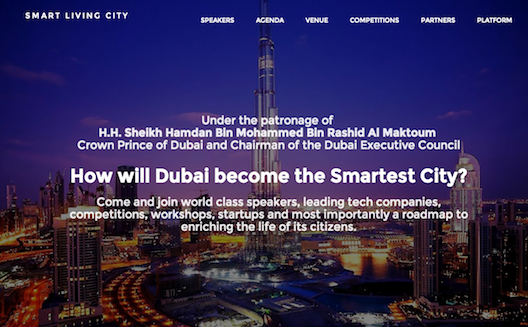5 components of a smart ecosystem, from SmartLivingCity Dubai


“Dubai is a transit city, a hub for people from all around the world and from all backgrounds.”
With these words Kamran Saddique, president and CEO of the City Innovate Foundation and cofounder of Inside Investor, summarized the reason he chose Dubai as the host of the first SmartLivingCity event, held at Jumeirah Emirates Tower on September 15 and 16.
Choosing Dubai to host the event didn’t happen by accident, said Saddique, who organized the event in partnership with Tasweek under the auspices of Sheikh Hamdan bin Mohammed bin Rashid Al Maktoum. “The city is characterized by active and tech-savvy people who are eager to transfer knowledge,” he said.
He and the organizers wanted the event to be a meeting place for public and privatesector decision-makers, international speakers, academics, and entrepreneurs, attempting to reach together a definition of smart cities and their components.
Participants agreed on the fact that a smart ecosystem is one where decision-makers are involved on all levels, “For me, a smart ecosystem is one that relies on technology and promotes radical innovation and behavioral change, and where all parties are involved, including the government, institutions, and infrastructure,” said Kamal Hassan, founder and CEO of the accelerator i360. Hassan believes that the MENA region is not a smart ecosystem yet; what is still lacking is coordination between incentives and linking between all the parties to achieve the success of the ecosystem.”
Throughout the SmartLivingCity event, participants tried to identify the components needed to build a smart ecosystem, and even though they agreed that there is no magical recipe, they cited a few first steps:
- Adopting a comprehensive vision: “If we develop such a vision,” says Hassan, “and give everyone what they need, be they banks or entrepreneurs, everything would go just fine.” He believes that accelerators play an important role, since they invest in technology, allowing for the ecosystem to invest in turn in entrepreneurs.
- Modifying the laws: The topic of laws is almost always discussed at entrepreneurship events in the UAE, as they constitute a major challenge. But the Emirati government is working on it, according to Alexander Mathew Williams, Strategy and Policy Director at Mohammed Bin Rashid Establishment for SME Development, who shed light on the government’s initiatives to solve existing legal problems, the most important of which being bankruptcy.

- Changing mindsets: For all the players in the ecosystem to cooperate with each other, tactical initiatives aimed at changing mindsets and behaviors will no doubt be necessary. Youssef Moutawaa, Chief Information Officer at DP World, emphasized the necessity of an innovation-friendly environment and culture that would allow entrepreneurs to fail and to experiment without being judged. Relations between large companies and startups also need to be improved, according to Ken Singer, the director of UC Berkeley’s Center for Entrepreneurship and Technology, since each has a fundamental role in the ecosystem.
- Promoting risk-taking: When mindsets are changed, taking risks is possible. Serb Jodha, head of operations at Incept.co, believes that educational programs for angel investors will be important in the next stage so as to take away some of the fear. For his part, Singer believes that the ecosystem in the region should offer a second chance or a plan B for entrepreneurs who take risks and found their own companies. “Giants like Google and Microsoft spend an awful lot of time in our incubators waiting for an entrepreneur to fail, so as to recruit them or acquire their company,” he added.
- Facilitating funding: Participants disagreed on the nature of the funding challenge facing the Arab world; some believe that funds are abundant but are not being employed properly, and others see startups as lacking much of the needed funding. Kamal Hassan believes that the region does not lack seed or angel investors; many individuals are looking to invest in startups. However, what the region lacks is venture capital, and that is for two reasons. The first has to do with the fact that the number of startups “worthy” of Series A funding is very low. The second reason is that venture capital funds in the region are still very few and often try to take control over the companies through their share of equities and by micromanaging the smallest details. Hassan believes that the ideal role of VC funds should be injecting money into the startups and building their networks.
The road to a smart ecosystem for Arab entrepreneurs might be bumpy and long. However, Kamran Saddique and the other organizers, by gathering these participants (as well as 39 speakers), have tried to lay the foundation. SmartLivingCity will be held twice a year, next in San Francisco, and then Singapore.


